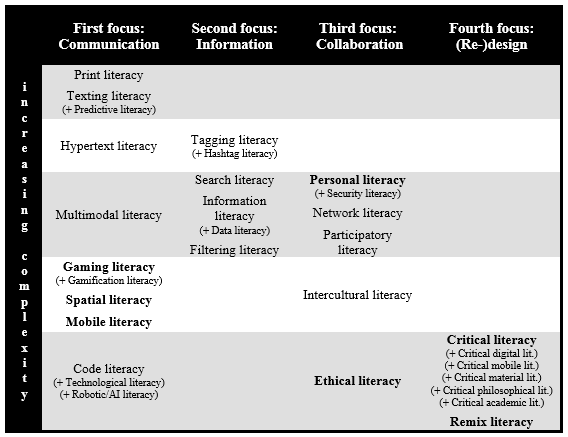OTAN News
Helping Our Students Develop Digital Literacies
We know the importance of digital literacy skills for our adult education students, but a growing number of educators are stressing the need for our students to possess digital literacies.
As professor and researcher Mark Pegrum explains on his website, “...we need to teach students far more than print literacy skills; we need to help them develop a whole suite of digital literacies to enable them to operate effectively in contemporary culture. These digital literacies are often viewed as part of, or at least linked to, what many educators are calling 21st century skills.” With fellow researchers Gavin Dudeney and Nicky Hockly, the three have developed a framework that places each of these digital literacies under one of four focuses – Communication, Information, Collaboration, and (Re-)Design – from less to more complex. See the framework below:

Revised framework of digital literacies 2018 (Source: Adapted from Pegrum, Dudeney & Hockly, ‘Digital literacies revisited’, The European Journal of Applied Linguistics and TEFL, 7(2), 3-24)
Pegrum also provides an explanation for each literacy on his website and explains that many of the literacies are overlapping, depending on the skills that are being developed.
In its series Community Impact Stories, Digital Promise highlights the work of the University AME Zion Church in Palo Alto as one agency that has developed a strategy for helping its adult students develop a number of the digital literacies the researchers have identified that will be meaningful in the family, work, and civic lives of the students. The main point is that the Church works with the students to identify and develop the literacies that make the most sense for the students, rather than trying to touch as many literacies as possible or literacies that may not be the most relevant. Some examples from the Story:
-
Language and Communication: drafting email and text messages, creating resumes and other employment-related documents online
-
Information: using search engines, evaluating the credibility of information, accessing online resources
-
Collaboration and Connection: using online social and professional networks
-
(Re-)design: working towards micro-credentials, creating new multimedia products
As teachers, we have to think about digital literacy in a deeper way, and tailor our instruction to digital skills training that matches the needs of our students.
Website: Digital Learning by Mark Pegrum
Article: Boosting Digital Literacies for a Purpose from Digital Promise

